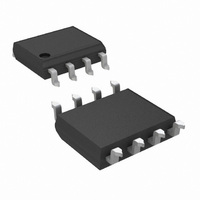LP2986IM-3.3/NOPB National Semiconductor, LP2986IM-3.3/NOPB Datasheet - Page 12

LP2986IM-3.3/NOPB
Manufacturer Part Number
LP2986IM-3.3/NOPB
Description
IC REG LDO 3.3V 200MA 8-SOIC
Manufacturer
National Semiconductor
Datasheet
1.LP2986IMM-3.3NOPB.pdf
(16 pages)
Specifications of LP2986IM-3.3/NOPB
Regulator Topology
Positive Fixed
Voltage - Output
3.3V
Voltage - Input
Up to 16V
Voltage - Dropout (typical)
0.18V @ 200mA
Number Of Regulators
1
Current - Output
200mA
Current - Limit (min)
250mA
Operating Temperature
-40°C ~ 125°C
Mounting Type
Surface Mount
Package / Case
8-SOIC (3.9mm Width)
Voltage Regulator Type
LDO Linear
Output Current Max
200mA
Peak Reflow Compatible (260 C)
Yes
Output Voltage
3.3V
Current Rating
0.2A
Output Voltage Max
3.3V
Rohs Compliant
Yes
Number Of Outputs
1
Polarity
Positive
Input Voltage Max
16 V
Output Type
Fixed
Dropout Voltage (max)
0.002 V at 0.1 mA
Output Current
0.2 A
Line Regulation
0.014 %/V
Voltage Regulation Accuracy
+/- 1 %
Maximum Operating Temperature
+ 125 C
Mounting Style
SMD/SMT
Minimum Operating Temperature
- 40 C
Lead Free Status / RoHS Status
Lead free / RoHS Compliant
Other names
*LP2986IM-3.3
*LP2986IM-3.3/NOPB
LP2986IM-3.3
*LP2986IM-3.3/NOPB
LP2986IM-3.3
Available stocks
Company
Part Number
Manufacturer
Quantity
Price
Company:
Part Number:
LP2986IM-3.3/NOPB
Manufacturer:
NS
Quantity:
183
www.national.com
Application Hints
LLP PACKAGE DEVICES
The LP2986 is offered in the 8 lead LLP surface mount pack-
age to allow for increased power dissipation compared to the
SO-8 and Mini SO-8. For details on LLP thermal performance
as well as mounting and soldering specifications, refer to the
LLP MOUNTING
EXTERNAL CAPACITORS
Like any low-dropout regulator, external capacitors are re-
quired to assure stability. These capacitors must be correctly
selected for proper performance.
INPUT CAPACITOR: An input capacitor (
between the LP2986 input and ground (amount of capaci-
tance may be increased without limit).
This capacitor must be located a distance of not more than
0.5” from the input pin and returned to a clean analog ground.
Any good quality ceramic or tantalum may be used for this
capacitor.
OUTPUT CAPACITOR: The output capacitor must meet the
requirement for minimum amount of capacitance and also
have an appropriate E.S.R. (equivalent series resistance) val-
ue.
Curves are provided which show the allowable ESR range as
a function of load current for various output voltages and ca-
pacitor values (see ESR curves below).
IMPORTANT: The output capacitor must maintain its ESR in
the stable region over the full operating temperature range of
the application to assure stability.
ESR Curves For 2.5V Output
ESR Curves For 5V Output
section.
≥
2.2 µF) is required
1293506
1293507
12
The minimum required amount of output capacitance is
4.7 µF. Output capacitor size can be increased without limit.
It is important to remember that capacitor tolerance and vari-
ation with temperature must be taken into consideration when
selecting an output capacitor so that the minimum required
amount of output capacitance is provided over the full oper-
ating temperature range. A good Tantalum capacitor will
show very little variation with temperature, but a ceramic may
not be as good (see next section).
CAPACITOR CHARACTERISTICS
TANTALUM: The best choice for size, cost, and performance
are solid tantalum capacitors. Available from many sources,
their typical ESR is very close to the ideal value required on
the output of many LDO regulators.
Tantalums also have good temperature stability: a 4.7 µF was
tested and showed only a 10% decline in capacitance as the
temperature was decreased from +125°C to −40°C. The ESR
increased only about 2:1 over the same range of temperature.
However, it should be noted that the increasing ESR at lower
temperatures present in all tantalums can cause oscillations
when marginal quality capacitors are used (where the ESR of
the capacitor is near the upper limit of the stability range at
room temperature).
CERAMIC: For a given amount of a capacitance, ceramics
are usually larger and more costly than tantalums.
Be warned that the ESR of a ceramic capacitor can be low
enough to cause instability: a 2.2 µF ceramic was measured
and found to have an ESR of about 15 mΩ.
If a ceramic capacitor is to be used on the LP2986 output, a
1Ω resistor should be placed in series with the capacitor to
provide a minimum ESR for the regulator.
Another disadvantage of ceramic capacitors is that their ca-
pacitance varies a lot with temperature:
Large ceramic capacitors are typically manufactured with the
Z5U temperature characteristic, which results in the capaci-
tance dropping by a 50% as the temperature goes from 25°C
to 80°C.
This means you have to buy a capacitor with twice the mini-
mum C
ALUMINUM: The large physical size of aluminum electrolyt-
ics makes them unattractive for use with the LP2986. Their
ESR characteristics are also not well suited to the require-
ments of LDO regulators.
The ESR of an aluminum electrolytic is higher than a tanta-
lum, and it also varies greatly with temperature.
A typical aluminum electrolytic can exhibit an ESR increase
of 50X when going from 20°C to −40°C. Also, some aluminum
electrolytics can not be used below −25°C because the elec-
trolyte will freeze.
USING AN EXTERNAL RESISTIVE DIVIDER
The LP2986 output voltage can be programmed using an ex-
ternal resistive divider (see Basic Application Circuits).
The resistor connected between the Feedback pin and
ground should be 51.1k. The value for the other resistor (R1)
connected between the Feedback pin and the regulated out-
put is found using the formula:
It should be noted that the 25 µA of current flowing through
the external divider is approximately equal to the current
OUT
to assure stable operation up to 80°C.
V
OUT
= V
FB
× (1 + ( R1 / 51.1k ))









